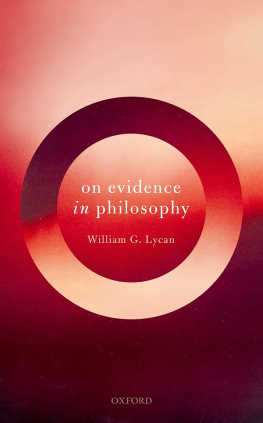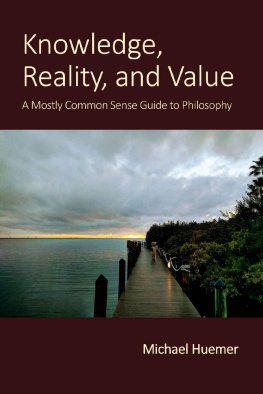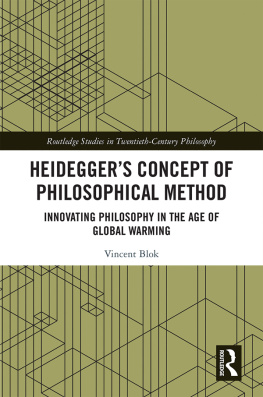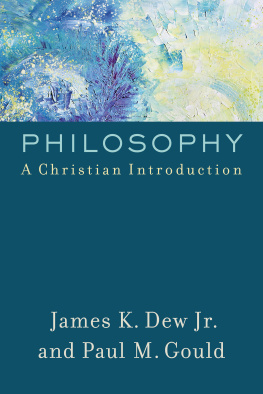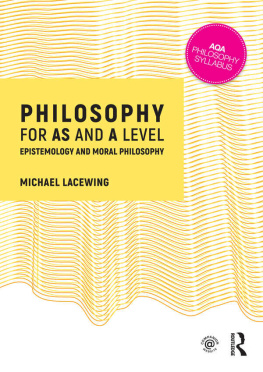Oxford University Press is a department of the University of Oxford. It furthers the Universitys objective of excellence in research, scholarship, and education by publishing worldwide. Oxford is a registered trade mark of Oxford University Press in the UK and in certain other countries
William G. Lycan 2019
All rights reserved. No part of this publication may be reproduced, stored in a retrieval system, or transmitted, in any form or by any means, without the prior permission in writing of Oxford University Press, or as expressly permitted by law, by licence or under terms agreed with the appropriate reprographics rights organization. Enquiries concerning reproduction outside the scope of the above should be sent to the Rights Department, Oxford University Press, at the address above
You must not circulate this work in any other form and you must impose this same condition on any acquirer
Published in the United States of America by Oxford University Press 198 Madison Avenue, New York, NY 10016, United States of America
Printed and bound in Great Britain by Clays Ltd, Elcograf S.p.A.
Links to third party websites are provided by Oxford in good faith and for information only. Oxford disclaims any responsibility for the materials contained in any third party website referenced in this work.
Much of the material here has previously appeared in print, but this book is not a collection of papers. The papers that are largely reprinted from earlier venues () were written to become part of the book.
For helpful comments and exchanges, warm thanks to: David Armstrong, Annette Baier, Heather Battaly, George Bealer, David Christensen, Earl Conee, Tim Crane, Chris Daly, Michael Devitt, Nick Georgalis, Alvin Goldman, Gary Gutting, Gil Harman, Frank Jackson, Michael Lynch, Ausonio Marras, Andrew Melnyk, Charles Pigden, Jim Pryor, Bill Robinson, Bill Roche, Jay Rosenberg, Bruce Russell, Ernie Sosa, Kim Sterelny, Steve Stich, Casey Swank, Jim Tomberlin, Peter van Inwagen, Fritz Warfield, James Willoughby, and certainly others whose communications I have neglected to record.
I am also grateful to each of three OUP reviewers, whose reports on an early draft have greatly increased the coherence of my presentation. One remains anonymous, one is Anthony Booth, and the third is David Henderson, whose extensive comments on two drafts have led to important corrections and other improvements.
Part of the Introduction was part of my John Dewey Lecture at the Eastern Division meeting of the APA, January, 2017; the lecture has since appeared, under the prescient title On Evidence in Philosophy, in the Proceedings and Addresses of the American Philosophical Association, vol. 91 (2017): 10217.
is based primarily on Moores Antiskeptical Strategies, in S. Nuccetelli and G. Seay (eds.), Themes from G.E. Moore: New Essays in Epistemology and Ethics (Oxford: Oxford University Press, 2007): 8499. Reprinted by permission of Oxford University Press.
is largely excerpted from Moore Against the New Skeptics, Philosophical Studies 103 (2001): 3553.
is a revised version of A Particularly Compelling Refutation of Eliminative Materialism, in D.M. Johnson and C.E. Erneling (eds.), Mind as a Scientific Object: Between Brain and Culture (Oxford: Oxford University Press, 2005): 197205. Reprinted by permission of Oxford University Press.
is an expanded version of Free Will and the Burden of Proof, in Anthony OHear (ed.), Minds and Persons (Royal Institute of Philosophy Supplement: 53, Cambridge: Cambridge University Press, 2003): 10722.
Much of is excerpted from Giving Dualism its Due, Australasian Journal of Philosophy 87 (2009): 55163.
Some paragraphs in are lifted from On Two Main Themes in Guttings What Philosophers Know, Southern Journal of Philosophy 51 (2013): 11220, and one from Bealer on the Possibility of Philosophical Knowledge, Philosophical Studies 81 (1996): 14350.
is based on Epistemology and the Role of Intuitions, in S. Bernecker and D. Pritchard (eds.), The Routledge Companion to Epistemology (London: Routledge, 2011): 81322.
contains a few paragraphs from Explanationist Rebuttals (Coherentism Defended Again), Southern Journal of Philosophy 50 (2012): 520.
My title is a pun, as between (a) what philosophers may use as evidence for theories and (b) what sorts of things philosophers may consider to be evident. Each of those is a central topic of this book.
I shall sketch an epistemology of philosophy itself, a partial method for philosophical inquiry. No element of it is original with me, but I do not think it has ever before been put together in the way I will do here.
What are the ultimate sources of justified philosophical belief?
First, common sense, in a carefully restricted sense of the termthe sorts of contingent propositions Moore defended against idealists and skeptics: Here is one hand; I had my breakfast before I had lunch; Right now I am standing up and talking to a roomful of people. In apply my particular version of Moores technique to each of two philosophical issues on which Moore has not previously been brought to bear: eliminativism in the philosophy of mind, and the free-will debate.
It must be emphasized that every Mooreancommonsensical belief is defeasible. Any of them might be refuted in context by some combination of reasons. I have said they are evidence, not that they are infallible. To call them evidence is controversial enough and requires considerable argument.
Our second source of justified philosophical belief is the deliverances of current science, particularly the hard physical and basic biological sciencesat least, whatever is well confirmed and fairly uncontroversial within the relevant field.
In any area of philosophy of mind, for example, the theorist should take the relevant scientific findings very seriously, even when those results do not legislate. Here are a number of claims that have been made about pain during the past fifty yearsmade a priori, or perhaps on the basis of introspection alone: that pain is self-intimating (i.e., if one has a pain one is necessarily and perhaps eo ipso aware of it); that ones belief that one is in pain is infallible and/or incorrigible; that pain is intrinsically unpleasant and necessarily motivates attempts to relieve it; that at least some pain is simple in that it does not have psychological components. Not one of those claims has been confirmed by empirical research on pain; each, though logically consistent with that research, is implausible in light of it.
But what is so great, or even tolerable, about common sense and science considered as evidence in philosophy? Each of them is conspicuously empirical, when philosophy itself is not empirical except possibly in the Quinean way that everything is, and especially when in each case there is a long tradition of rejection, skepticism, and at least questioning by philosophers far more talented and distinguished than I. In defense, I adopt Armstrongs (1973) test for the efficacy of an epistemic method: as a sign or mark of probity, we should judge a method by

